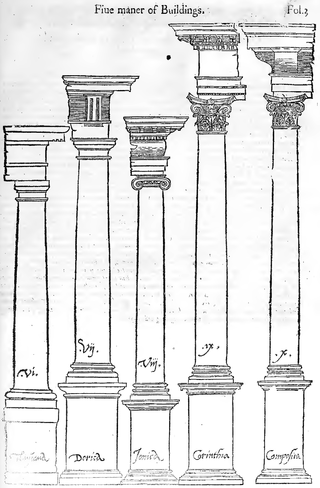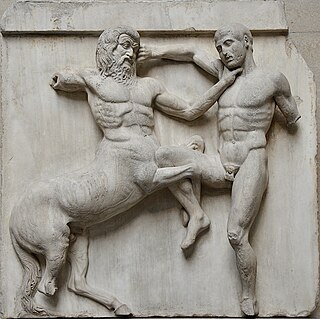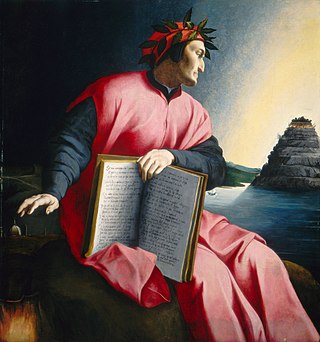Related Research Articles

Classics or classical studies is the study of classical antiquity. In the Western world, classics traditionally refers to the study of Classical Greek and Roman literature and their related original languages, Ancient Greek and Latin. Classics also includes Greco-Roman philosophy, history, archaeology, anthropology, art, mythology and society as secondary subjects.

The Renaissance is a period of history and a European cultural movement covering the 15th and 16th centuries. It marked the transition from the Middle Ages to modernity and was characterized by an effort to revive and surpass the ideas and achievements of classical antiquity. Associated with great social change in most fields and disciplines, including art, architecture, politics, literature, exploration and science, the Renaissance was first centered in the Republic of Florence, then spread to the rest of Italy and later throughout Europe. The term rinascita ("rebirth") first appeared in Lives of the Artists by Giorgio Vasari, while the corresponding French word renaissance was adopted into English as the term for this period during the 1830s.

Classical architecture usually denotes architecture which is more or less consciously derived from the principles of Greek and Roman architecture of classical antiquity, or sometimes more specifically, from De architectura by the Roman architect Vitruvius. Different styles of classical architecture have arguably existed since the Carolingian Renaissance, and prominently since the Italian Renaissance. Although classical styles of architecture can vary greatly, they can in general all be said to draw on a common "vocabulary" of decorative and constructive elements. In much of the Western world, different classical architectural styles have dominated the history of architecture from the Renaissance until World War II. Classical architecture continues to inform many architects.
Viriconium is a series of novels and stories written by English author M. John Harrison between 1971 and 1984, set in and around the fictional city of the same name.

William James Durant was an American historian and philosopher, best known for his 11-volume work, The Story of Civilization, which contains and details the history of Eastern and Western civilizations. It was written in collaboration with his wife, Ariel Durant, and published between 1935 and 1975. He was earlier noted for The Story of Philosophy (1926), described as "a groundbreaking work that helped to popularize philosophy".

The Story of Civilization (1935–1975), by husband and wife Will and Ariel Durant, is an 11-volume set of books covering both Eastern and Western civilizations for the general reader, with a particular emphasis on European (Western) history.

The culture of Europe is diverse, and rooted in its art, architecture, traditions, cuisines, music, folklore, embroidery, film, literature, economics, philosophy and religious customs.

Antiquities are objects from antiquity, especially the civilizations of the Mediterranean: the Classical antiquity of Greece and Rome, Ancient Persia (Iran), Ancient Egypt and the other Ancient Near Eastern cultures. Artifacts from earlier periods such as the Mesolithic, and other civilizations from Asia and elsewhere may also be covered by the term. The phenomenon of giving a high value to ancient artifacts is found in other cultures, notably China, where Chinese ritual bronzes, three to two thousand years old, have been avidly collected and imitated for centuries, and the Pre-Columbian cultures of Mesoamerica, where in particular the artifacts of the earliest Olmec civilization are found reburied in significant sites of later cultures up to the Spanish Conquest.

The World We Live In appeared in the pages of LIFE magazine from December 8, 1952, to December 20, 1954. A science series, it comprised 13 parts published on an average of every eight weeks. Written by Lincoln Barnett, The World We Live In spanned a diverse range of topics concerning planet Earth and universe, and employed the talents of artists and photographers, including cameramen Alfred Eisenstaedt and Fritz Goro and artists Rudolph Zallinger and Chesley Bonestell. The parts were illustrated with art and photos, often presented in large gatefolds which showed two sides of a scenario.
A river valley civilization is an agricultural nation or civilization situated beside and drawing sustenance from a river. A river gives the inhabitants a reliable source of water for drinking and agriculture. Some other possible benefits for the inhabitants are fishing, fertile soil due to annual flooding, and ease of transportation.

The Seven Wonders of the Ancient World, also known as the Seven Wonders of the World or simply the Seven Wonders, is a list of seven notable structures present during classical antiquity. The first known list of seven wonders dates back to the 2nd–1st century BC.

Fay-Cooper Cole was a professor of anthropology and founder of the anthropology department at the University of Chicago; he was a student of Franz Boas. Most famously, he was a witness for the defense for John Scopes at the Scopes Trial. He graduated from Northwestern University in 1903 and became Assistant Curator of Anthropology of at the Field Museum of Natural History the following year. He led the museum's Philippine expeditions, collecting more than 5,000 objects, traveling together with his wife, Mabel Cook Cole, with whom he co-authored The Story of Man. He helped establish the University of Chicago's graduate program in Anthropology and started an archeological survey of Illinois. Cole also played a central role in planning the anthropology exhibits for the 1933 Century of Progress World's Fair. He was elected a Member of the American Philosophical Society in 1941.

The Western world, also known as the West, primarily refers to various nations and states in the regions of Western Europe, Northern America, and Australasia; with some debate as to whether those in Eastern Europe and Latin America also constitute the West. The Western world likewise is called the Occident in contrast to the Eastern world known as the Orient. The West is considered an evolving concept; made up of cultural, political, and economic synergy among diverse groups of people, and not a rigid region with fixed borders and members. Definitions of "Western world" vary according to context and perspectives.

Western culture, also known as Western civilization, European civilization, Occidental culture, or Western society, includes the diverse heritages of social norms, ethical values, traditional customs, belief systems, political systems, artifacts and technologies of the Western world. Anthropologically, the term "Western" refers to the classical era culture that arose in Ancient Greece and Ancient Rome, and later spread to different parts of the world. The core of Western civilization, broadly defined, is formed by the combined foundations of Greco-Roman civilization and Christianity. While Western culture is a broad concept, and does not relate to a region with fixed members or geographical confines, it generally relates to the cultures of countries with historical ties to a European country or a number of European countries, or to the variety of cultures within Europe itself.

Italophilia is the admiration, appreciation or emulation of Italy, its people, culture and its contributions to Western civilization. Its opposite is Italophobia.

This bibliography of Greece is a list of books in the English language which reliable sources indicate relate to the general topic of Greece.

White gods is the pseudoscientific belief that ancient cultures around the world were visited by white races in ancient times, and that they were known as "white gods".

Western civilization describes the development of human civilization beginning in Ancient Greece, and generally spreading westwards. It can be strongly associated with nations linked to the former Western Roman Empire and with Medieval Western Christendom.

The Wonder Books are a series of books produced in the 1930s and 1940s. It was published by the University of Knowledge Incorporated, editor in chief being Glenn Frank. It is not to be confused with the children's book imprint of Grosset and Dunlap.
The Silurian hypothesis is a thought experiment, which assesses modern science's ability to detect evidence of a prior advanced civilization, perhaps several million years ago. The most probable clues for such a civilization could be carbon, radioactive elements or temperature variation. The name "Silurian" derives from the eponymous sapient species from the BBC science fiction series Doctor Who, who in the series established an advanced civilization prior to humanity, not from the eponymous geological period.
References
- ↑ Mabel Cook Cole (1940). Glenn Frank and Fay-Cooper Cole (ed.). The Story of Primitive Man: His Earliest Appearance and Development .
- ↑ Robert Marten Engberg (1940). Glenn Frank and Fay-Cooper Cole (ed.). The Dawn of Civilization: and Life in the Ancient East.